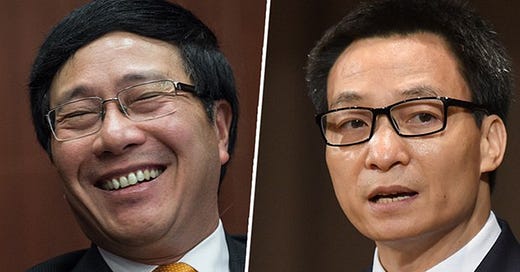In Vietnam, Some Good Guys Take a Fall for the Team
Two highly regarded deputy prime ministers forced out over corruption
By: David Brown
2023 is shaping up as another big year for show trials in Communist Vietnam.
2022 was the year that Vietnam shook off the Covid pandemic and posted the best economic growth numbers in East Asia. Now the regime is challenged to harness the opportunities offered by a tidal wave of foreign direct investment (much of it fleeing China) to grow the public sector.
There’s plenty of public business that’s grown urgent. At COP26, the prime minister pledged that Vietnam would be carbon-neutral by 2050. More than a year later, intra-government factions are still arguing about how, actually, they’ll disengage the national economy from carbon fuels. Big infrastructure projects are falling ever further behind schedule. Public education and public health remain woefully underfunded.
There are lots of new jobs for skilled workers as foreign-owned firms consolidate supply chains around Hanoi and Ho Chi Minh City, but there are, apparently, very few opportunities for Vietnamese enterprises to get pieces of the action.
And, in the public sector, although a great deal of attention has been paid to finding and punishing corrupt officials, graft and scandal remain ubiquitous. General Secretary Nguyen Phu Trong is now 78, so we should believe him when he says he yearns to turn over the leadership of the Communist Party (CPV) to a suitable successor. However, there’s so much work still to be done.
Ninety-five percent of Vietnam’s 100 million people are not CPV members. The public were rightly appalled when, a year ago, the Ministry of Public Security cracked open a couple of schemes and arrested scores of officials. Both schemes fed on fear of the Covid virus and in retrospect were so blatant and extensive that it is hard to imagine how their architects hoped to escape detection.
Scheme #1 bears the name of a military-affiliated medical supply company, Viet A, that manufactured substandard PCR test kits. Officials of the Ministry of Health and Viet A’s CEO reportedly connived to keep other firms out of the market and jack up prices for Viet A’s kits. It is estimated that US$34 million found its way into the pockets of over 100 central and province-level officials including the then-Minister of Health.
Scheme #2 dwarfs the Viet A scandal. It was concocted by the consular staff of Vietnam’s Foreign Ministry who arranged repatriation for Vietnamese citizens who were abroad when the nation ‘locked down’ and regular international air service ceased. Desperate to get home, many paid extortionate – and blatantly illegal – fees for the paperwork and other services necessary to obtain seats on some 2000 ‘rescue flights’ arranged by the government. The ‘rescue flight’ scandal is said to have put as much as US$2 billion into the pockets of the Deputy Foreign Minister in charge of consular services, a number of ambassadors and their subordinate staff and cooperators in other agencies. Thirty nine individuals were under arrest as 2023 began.
The party-state regime wants to show itself resolute in prosecuting failures that made the lives of ordinary citizens miserable during the pandemic. A senior police official said on January 3 that said the Ministry of Public Security hopes to complete investigations into the Viet A and rescue flight scandals by the end of the month.
The regime has ignored a chorus of online commentators that insists that the pain inflicted by the two scandals is nothing compared to misery inflicted by local authorities’ brutal administration of lockdowns in cities where the Covid virus got out of control. That’s a can of worms it is not going to open.
As the Western new year approached, however, CPV leaders showed themselves considerably more sensitive to demands that top officials – specifically the Deputy Prime Ministers respectively charged with supervision of social services (Vu Duc Dam) and foreign affairs (Pham Binh Minh) – acknowledge personal responsibility for the malfeasance of their subordinates by resigning their posts.
That’s exactly what happened last week. It is so rare in Communist Vietnam that analysts were challenged to find the single precedent: CPV Secretary General Truong Chinh’s resignation in 1956 to take responsibility for a disastrously executed program of rural land reform.
Both Minh and Dam are reported to have “taken political responsibility before the party and the people” – not criminal culpability – and in consequence, the CPV Central Committee has “agreed to let both . . . resign from their positions in the party.” Bui Thanh Son, the incumbent Foreign Minister, seems to be negotiating his exit on, he must hope, no worse terms.
In Vietnam’s cyberverse, online debate now centers on what the expulsion of Minh, Dam and probably Son may mean for the management of CPV General Secretary Trong’s war on intraparty corruption and backsliding. Some commentators claim to see the shadow of Xi Jinping over these recent events.
Abroad, and particularly in Washington, all three cashiered ministers have been held in high regard. The two new deputy prime ministers, named on January 5, are virtual neophytes in foreign affairs; they will likely take some considerable time to get up to speed in their new positions.
David Brown is a former US diplomat with extensive experience in Southeast Asia and is a longtime contributor to Asia Sentinel



